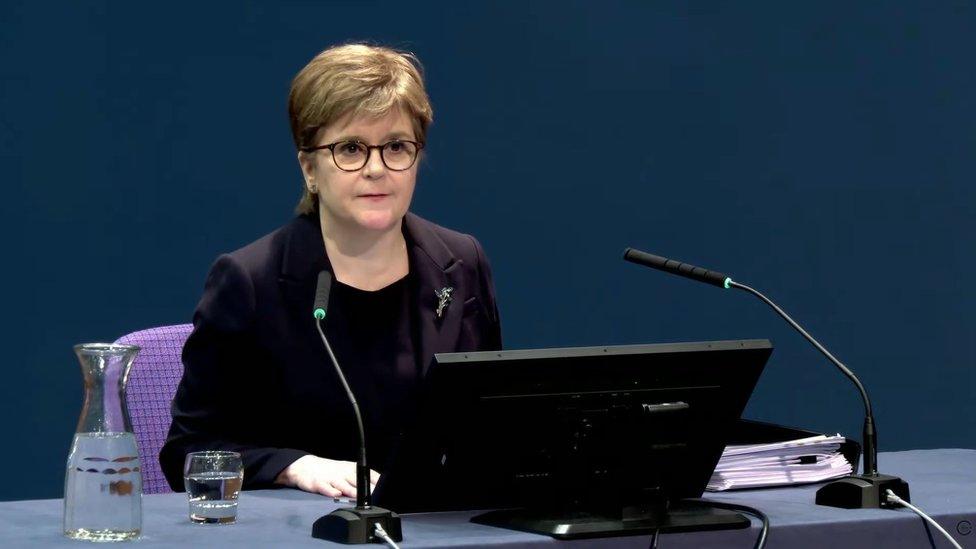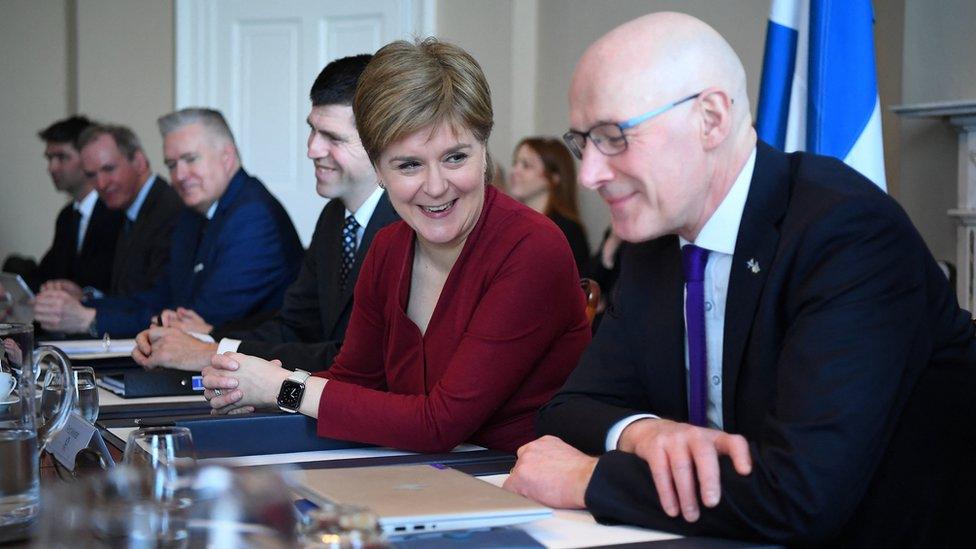The awkward Covid questions Nicola Sturgeon faced
- Published

Nicola Sturgeon has, predictably, been a less prominent fixture in Scottish politics since she stood down as first minister.
But Wednesday's marathon evidence session was a reminder that she took centre stage during one of the bleakest periods in living memory.
The former first minister is largely at home in this kind of forum.
She is no stranger to being quizzed and scrutinised, to having her comments and decisions pored over.
And even her most ardent political opponents will concede that she's a talented communicator. This forum was all about communication.
For much of this full-day session Ms Sturgeon was on sure ground, defending her pandemic approach.
But there were awkward areas that she had to address.
First up - WhatsApps.
Ms Sturgeon confirmed her messages from the pandemic had not been "retained".
After a slightly pedantic exchange about wording, she conceded this meant she had deleted them.
We got a broadly similar explanation for her approach as we've had from other ministers and officials.
Scottish government guidance advised that messages should be regularly deleted from phones once significant information had been saved centrally.
Critics are swift to point out this policy means ministers essentially mark their own homework: they decide what's relevant (and therefore saved) and what disappears forever.
Watch: Key moments as Nicola Sturgeon gives evidence to the UK Covid Inquiry
The former first minister insists she did not do a lot of messaging on her phone during the pandemic.
But one exchange that the inquiry did get hold of showed her discussing hospitality rules with a key advisor. To most, it would have looked like decisions - or at the very least important discussions - were happening on the app.
The former first minister stressed that those discussions were taking place in tandem in more formal settings.
This was one of the more difficult areas for Ms Sturgeon, and she did have to concede that she had made public statements that suggested there would be more access to her WhatsApps than proved, ultimately, to be the case.
The inquiry felt like it slightly went around in circles on this point.
The former first minister believes all relevant information has been made available to the inquiry.
Others, including some bereaved families, feel they are not getting the full picture.
These two groups will probably never see eye to eye on this.
WhatsApps aside, the first minister's leadership style was under the microscope.
Some believe Ms Sturgeon had a tendency to make the big calls herself, or with a very limited group of political allies.

Ms Sturgeon and former deputy first minister John Swinney at her final cabinet meeting in March 2023
But the former first minister stressed that she never wanted "carte blanche", and while she preferred to keep meetings small she expected input from her fellow ministers.
It is worth remembering that while the SNP may have a fair bit of infighting going on at the moment, that wasn't the case for the vast majority of Ms Sturgeon's time leading the party.
And it is perhaps not hugely surprising that ministers were often happy to delegate decision making to a leader who was proving popular during the pandemic - and had proven herself to be a consistent election winner.
There were moments today where Ms Sturgeon got emotional. She told the inquiry a part of her wishes she hadn't been first minister during the pandemic.
It was a reminder that having to make decisions that hugely impact on people's lives can weigh heavy on elected officials.
This echoed some of Ms Sturgeon's leadership style that came out during the pandemic.
In those months she occasionally made clear that hers was a high pressure job, and that the restrictions governing daily life affected her too.
Emotional toll
But it seemed like we saw more of the emotional toll today than we had ever seen before.
It was evident when she spoke about her regret over not locking down earlier, and the loss of life in care homes.
Though it appeared there were some parts of this session that Ms Sturgeon found hard to reflect on, there were plenty of areas that seemed to be comfortable ground.
Her government's approach to some of the operational decisions during Covid (e.g. testing, quarantines and lockdowns) has faced criticism.
But it was obvious that the former SNP leader was across the detail and content to defend her decisions.
She insisted that she had not tried to politicise the pandemic. Indeed, she pointed out that her government paused plans for a second independence referendum.
Ms Sturgeon was on slightly shakier ground trying to explain why cabinet minutes from June 2020 said that consideration should be given to restarting work on independence.
Though, as she pointed out, work on Brexit continued as the pandemic raged across the UK and Europe.
And talking of Brexit, it's clear that there was no love lost between Ms Sturgeon and the politician who made that constitutional change happen - Boris Johnson.
The former first minister has made it obvious that she believes Mr Johnson was not the right leader for a pandemic, and that she found him difficult to work with.
Given that we had already seen some private messages where Ms Sturgeon was slightly rude (to put it mildly) about the then prime minister, we probably didn't discover anything we didn't already know.
When it comes to outlining and explaining her decisions from the pandemic she knows how to get her message across.
Her evidence today felt, at points, like a flashback to her daily TV briefings during the global health crisis.
Then she would spell out her government's thinking and the conclusions they had arrived at.
But, similar to those briefings, there will be those who don't like what they heard.
And though Ms Sturgeon has explained why she deleted phone messages, many will find it impossible to ever make a judgement on how the pandemic was handled when they feel they are being denied the full picture.
Her overall message was that she did her best in incredibly challenging circumstances.
Many Scots, to this day, feel lucky that she was in charge at a time of national emergency.
But some will still feel - after an entire day of probing - that some key questions remain unanswered.